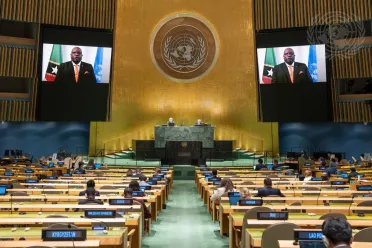Statement
Statement summary
TIMOTHY HARRIS, Prime Minister of Saint Kitts and Nevis, said the battle against COVID-19 is not yet won, and its devastating impact on societies and economies continues. Making the world safe requires equitable access to vaccines and other medical products and technologies. With help from the COVAX facility, 66 per cent of the adult population of Saint Kitts and Nevis is fully vaccinated. Along with an effective response plan, it is paramount to continue investing in a resilient health system and comprehensive public health services. Mental health and well-being are also vital, and services are now available through the National Counselling Centre. Sadly, the pandemic’s economic impact will be felt for years to come. Tourism — the nation’s biggest economic driver — ground to halt, and the Government implemented a multimillion-dollar stimulus package, reduced corporate income tax for employers retaining 75 per cent of their workforce and introduced tax and import duty waivers for pandemic-related products.
Turning to climate change, he said the pandemic’s impact on development goals means that efforts must be redoubled. Climate change and climate-related events continue to threaten the existence of small island developing States, and as it intensifies, the world witnesses its impact: the erosion of coasts owing to rising sea levels; fisherfolk struggling to maintain their livelihoods from waning oceanic diversity; and families forced to relocate away from coastal areas due to the strength, intensity and relentlessness of each passing hurricane season. Sustainable Development Goals 13, 14 and 15 are of particular significance, he said, adding that a less negative outcome of the pandemic has been its effect in turbo-charging the digitization of the workplace and societies. But, not all countries — particularly small island developing States — have the infrastructure, capacity and workforce skills to fully benefit from this revolution. Rebuilding sustainably requires re-evaluating digital accessibility, affordability and technical assistance so every country can exploit the digital economy in one properly networked world.
Outlining other barriers to development, he first pointed to the criteria employed to determine aid and financial support, with the GDP per capita benchmark being simplistic and flawed, falling short from recognizing other critical factors. Bias and the omission of such factors as vulnerabilities prevents nations like Saint Kitts and Nevis from accessing critical development assistance, he stated, calling for a new set of more adequate and relevant measures encompassing social, environmental/climate-related and economic considerations to regulate entitlements, such as a multidimensional vulnerability index. The protection of life from violent crime is also of fundamental importance and discussions surrounding small arms and light weapons remain critical to democracy. Reiterating that uncontrolled proliferation of illicit firearms has significant effects on economic development and human rights of every citizen in the world, he said the new challenges emerging from the technological development must be considered and confronted.
Partnerships are critical going forward, he said, noting that Saint Kitts and Nevis continues to build strong alliances. In this vein, he raised several concerns, calling for the lifting of the embargo against Cuba and renewing a call for Taiwan’s inclusion in the international community. Recalling the recent meeting on the twentieth anniversary on the Durban Declaration, he underlined the importance for the world to be united against racism, racial discrimination, xenophobia and related intolerance. Untold suffering and evil were inflicted on millions of men, women and children of African descent, as a result of the transatlantic slave trade, colonialism, apartheid and many of the other ills of history and other crimes against humanity. Welcoming the establishment of the Permanent Forum for People of African Descent, he echoed the region’s clarion call for reparations and reparatory justice. For its part, Saint Kitts and Nevis has formed the Caribbean Community (CARICOM) Reparations Committee and established a 10-point plan that outlines the path to reconciliation and justice for victims of crimes against humanity and their descendants, he said, expressing hope that this meeting invokes a renewed momentum to pursue action to right the wrongs that are still manifested today.
“We are all in this together; my hope is that we will emerge from COVID-19 stronger and more united than before,” he said. “There is no better place than the General Assembly to forge a positive consensus in order to build a better future for our children, our grandchildren and their children. We are living in unprecedented times, and we have responded admirably so far, but we must continue to be proactive, relentless, resilient, and willing to share our ideas and resources as members of the same brotherhood of nations. We look therefore to the future with hope and with great expectation.”
Full statement
Read the full statement, in PDF format.
Photo

Previous sessions
Access the statements from previous sessions.
